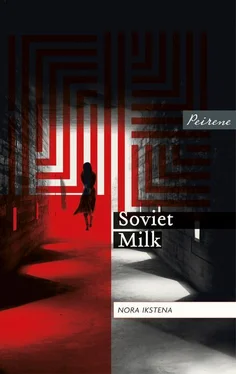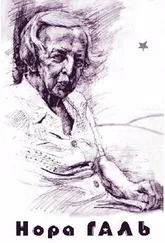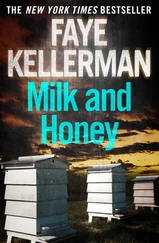‘We have no choice,’ he explained. ‘She tried to take her life. Consciously tried, despite being a mother and a doctor.’
The summer passed me by. Both by the sea with my grandparents and in my mother’s house with Jesse, all we thought and talked about was her. I went to see her at the psychiatric hospital three times a week. I had to sign in. The hospital orderly would attach a doorknob to the door and let my mother out for a walk with me in the madhouse yard.
We walked in circles or sat on the broken benches. Mother smoked greedily and constantly, as if I had brought her the elixir of life in cigarette packets.
‘Say hello to Jesse,’ she said. ‘And Mother and Stepfather.’ She repeated the same thing again and again. I could not muster the courage to ask the question that was tearing me in half.
‘How is the sea?’ she asked. ‘Do you also go over to our house? Jesse must be taking good care of it.’
She asked and I answered with a brief yes or no, for sure, good, as always.
‘You don’t want to talk to me,’ she concluded, suddenly offended.
‘You don’t want to live,’ I threw back.
‘I don’t want to,’ Mother responded.
‘So what will happen now?’ I asked.
‘They’ll sign me out after a month, after determining what category of disability support I fall into. Then I’ll return home. I want to be at home. It’s dreadful here. Inside.’
‘And we, Mamma, will we have to live in constant fear for you? I’m afraid for you. I’m afraid, Mamma. I’ve been afraid since my early childhood.’
‘Forgive me, I’ll try. I’ll try! Forgive me,’ my mother repeated, in fits and starts, as she smoked.
‘Look, Mamma, everything is in blossom around us. We could sit in our garden, chat with Jesse, whip up a strawberry mousse, walk in the fields, swim in the river…’
‘Hug me. Hug me tightly and kiss me,’ my mother said. Suddenly her face was revealed to me in the sharp light of the sun. It had aged all at once. The smooth skin hung loose, dark hollows lay under her eyes, and deep lines of sorrow stretched away from them, as if etched into her hard face by the constant flow of salty tears.
I hugged my mother and kissed her.
‘You’ve returned. I called you back so fervently, you’ve returned. Everything will be fine, Mamma.’
*
They eventually signed me out towards the end of August. The female doctor in charge treated me as if I were the lowest creature on earth. A mother, a doctor – but a Tvaika Street psychiatric patient. They filled me with enough medication to fell a horse. I allowed them to.
My daughter and Jesse came to help me pack and to take me home. They tried to talk about all sorts of trivia until we were standing outside the asylum gate.
‘Listen! Never again will you have to be here,’ Jesse said with determination.
My daughter held tight to my hand. She led me as if I were an unruly goat who might slip away from her at any moment.
‘I stole your summer,’ I said to her.
‘There are still a couple of weeks left. We’ll be able to go mushrooming,’ she replied matter-of-factly.
My clean, orderly home and garden welcomed me. What pains the two of them had taken! My room smelled of apples. There was a vase of Michaelmas daisies on the table, which had been laid for a meal. Life was waiting for my return.
They busied themselves around me, warmed up food, unpacked our bags. I looked on. I wanted to stop what was happening as one stops a car in order to hitch a lift. But all that was happening passed me by. I wanted to say, ‘Jesse – stop fussing! We’re on the Milky Way, playing, dipping our legs in until our feet disappear.’ But I was silent. I looked on as they organized me to go on living.
‘I’ve managed to get work for you,’ Jesse said happily. ‘Tying wire brushes. To clean off rust. You can make good money. There’s no need for any documentation; the work will be formally in my name.’
‘Tying wire brushes?’ My daughter was not convinced. ‘But Jesse, maybe Mamma can still go and talk about a job at the ambulatory centre?’
‘Nothing will come of it there,’ Jesse said. ‘Word has reached them. They know everything that happened.’
‘Tying brushes, Jesse – that’s magnificent, thank you. I’ll tie wires with all my heart and soul.’ I said it genuinely, but my daughter and Jesse heard irony in my voice.
‘Can you get something better? How much disability compensation will you get and when?’ Wounded feelings could be heard in Jesse’s words. ‘I’ll help you in the beginning. I know how. It’s not complicated work,’ she continued.
‘Fine, Jesse, fine. We’ll tie brushes.’
I felt weak and went to lie down in my room. My daughter covered me with a blanket.
‘Sleep for a while, Mamma. Rest,’ she said, stroking my head.
Half-asleep, half-awake, I heard my daughter talking with Jesse.
‘She’s given up completely. She’s smarter than all of us, more courageous than all of us. She’s an excellent doctor, Jesse, she knows about saving lives. But, Jesse, she also knows how to die. How can we support her? Why should she submit to this injustice? She was supposed to work at the Leningrad Institute! But now you’re going to teach her to tie wire brushes! What is this life in which I have to betray Teacher Blūms and my mother doesn’t want to live at all?’
‘Don’t talk like that,’ I heard Jesse say, trying to comfort my daughter. ‘This is the hand that we’ve been dealt. We’re worn out from carrying heavy burdens. Everything has to be accepted with humility, even wire brushes. Then you’ll regain your strength of soul.’
‘Jesse,’ said my daughter, ‘you speak beautifully, as if you were a book.’
I dozed off. Sleep set me free. Then they woke me for dinner.
*
The new school year soon came round. My form teacher took particular care of me. She continued to wear a black ribbon in her hair. Several times she asked how my mother was. I answered politely that everything was fine. One day she called me into her cramped cubbyhole of an office.
‘You can’t let things slide in any subject. Your marks have to be exemplary.’
‘I am trying.’
‘I know where your mother was this summer. And then there’s the Blūms case. You have to be exemplary so that no one can accuse you of anything.’
My harsh form teacher’s face suddenly thawed. She clasped my hand and began to speak quite differently.
‘Dear child, you have to keep your chin up. You can’t slip up in any way. You have to be the best.’
Dear child? I was stunned.
‘I’m often afraid for you,’ she continued. ‘Afraid you might fall apart. All your troubling experiences with your mother.’
I suddenly felt sorry for her. ‘Teacher, everything will be fine. My mother is better, and she has someone who looks after her.’
‘Good. That’s very good,’ she said, and offered me a sweet. ‘But all this must stay between us two, agreed?’
‘Agreed, Teacher.’
My marks improved. My combined autumn and winter school report was very good. For both the school holidays I forced myself to go to stay with my mother. She had settled, to a degree. Jesse supplied the brush bases and the wires, and my mother had become adept at tying them, demonstrating as much talent in this as she had in consultations with her patients. In fact she was earning just as much. For each of the school breaks she supplied me royally with pocket money – fifty roubles.
I brought gifts for my grandmother and stepgrandfather back with me from each of those visits. Sometimes my mother baked a cream of wheat cake, other times I brought home a roast chicken, and other times she made stuffed cabbage. Everything she made tasted good.
Читать дальше












